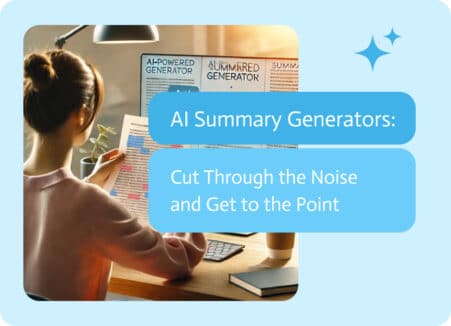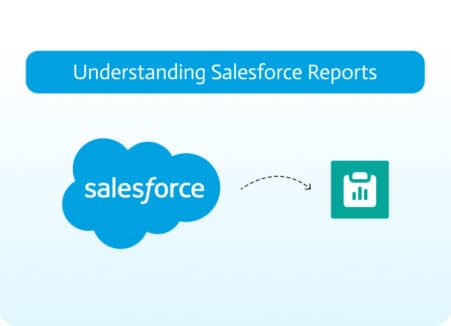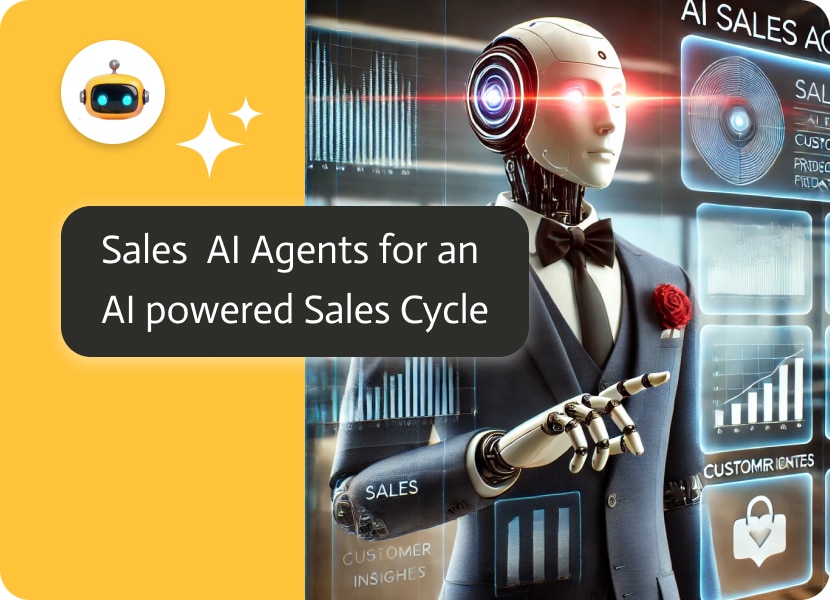
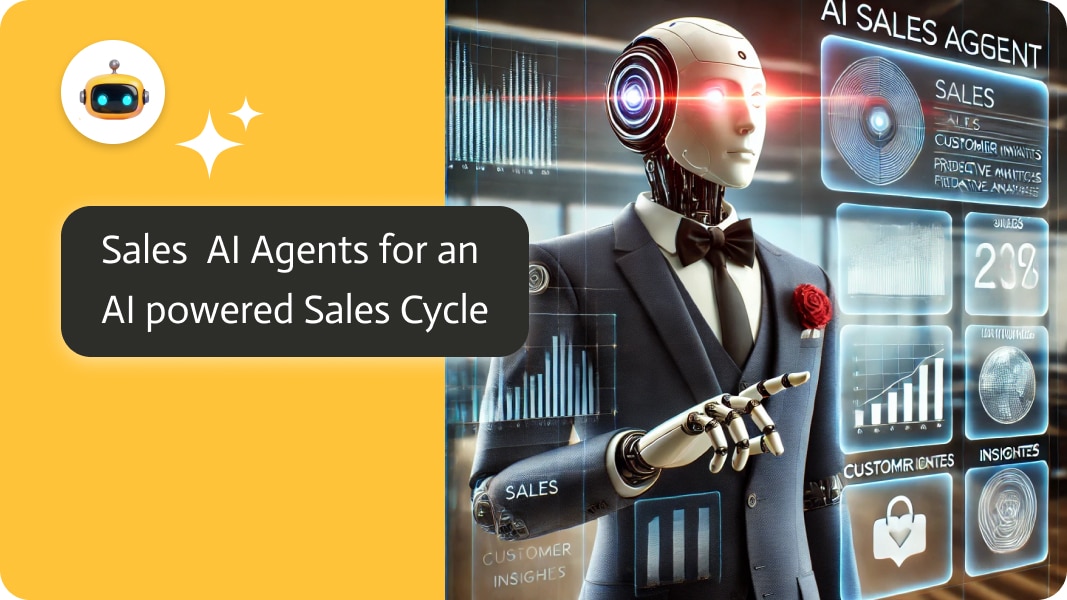
Sales AI Agents for an AI powered Sales cycle
Sales teams face growing pressure to manage vast amounts of data, customer interactions, and administrative tasks. AI-powered sales agents act as virtual assistants, automating workflows, Qualifying Leads, and enhancing customer engagement. These intelligent systems improve efficiency, increase revenue potential, and enable sales reps to focus on strategic relationships rather than repetitive tasks.
These AI agents help businesses streamline operations by handling lead qualification, automating responses, and providing sales forecasts with unparalleled accuracy. As organizations adopt AI-driven sales strategies, the role of AI agents will continue to expand, transforming sales processes into data-driven, highly efficient workflows.
Human-AI Collaboration in Sales: The Best of Both Worlds
The rise of AI Sales Agents does not mean the replacement of human Account Executives (AEs). Instead, AI is enhancing sales teams by acting as a powerful collaborator that improves efficiency and effectiveness. The best sales organizations are leveraging AI to complement human intuition and relationship-building skills, rather than replace them.
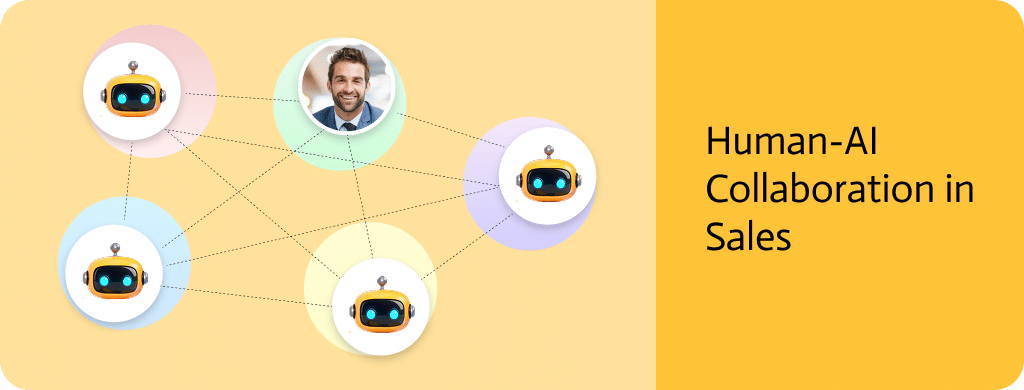
How AI and Human AEs Work Together
- AI Handles Repetitive Tasks, Humans Focus on Strategy: AI automates lead qualification, follow-ups, and data entry, allowing human AEs to focus on building strong relationships and closing deals.
- AI Surfaces Insights, Humans Drive Conversations: AI analyzes vast amounts of data to identify trends, recommend actions, and optimize outreach strategies, while sales reps use these insights to personalize interactions and establish trust.
- AI Provides Real-Time Coaching, Humans Execute Strategy: AI-powered analytics can suggest the best communication approach based on past interactions, helping AEs refine their pitches and improve performance.
- AI Tracks Engagement, Humans Adapt and Respond: AI monitors how prospects engage with content, emails, and calls, enabling human reps to adjust their approach based on real-time data.
The Future of AI-Human Sales Collaboration
AI is not replacing salespeople—it is making them better. By handling routine tasks and providing intelligent insights, AI allows AEs to do what they do best: build relationships, understand customer needs, and close deals. Companies that successfully integrate AI into their sales processes will see increased productivity, higher win rates, and more satisfied customers.
Use Cases for AI Sales Agents
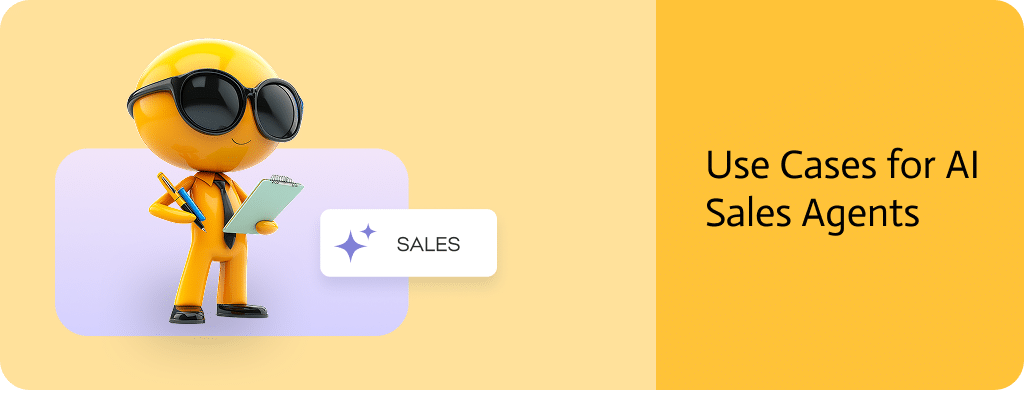
1. AI-Powered Lead Qualification
Sales teams often struggle to distinguish high-potential leads from those unlikely to convert. AI sales agents analyze multiple data points—such as browsing behavior, past interactions, and demographic details—to score leads and prioritize follow-ups. This eliminates time wasted on low-quality prospects and ensures that sales reps focus on leads with the highest likelihood of conversion.
2. AI for Sales Engagement
Prospective customers expect fast and personalized engagement. AI sales agents handle outreach by sending customized follow-ups, engaging with leads through chatbots, and even suggesting the best time for sales reps to reach out. AI ensures every interaction is timely and relevant, significantly improving engagement rates and shortening the sales cycle.
3. AI-Powered Lead Enrichment
Having a new lead is just the beginning; understanding that lead is what truly matters. AI-powered lead enrichment agents enhance incoming leads by gathering additional information such as job titles, company size, industry, revenue, and recent business activities. By integrating with external data sources, AI ensures sales teams have the most complete and up-to-date profile of every lead, enabling personalized and strategic outreach.
4. AI-Driven Lead Generation
Instead of waiting for leads to come in, AI agents proactively find new prospects. When a new lead is captured, an AI-powered lead generation agent scans the web and data sources to find 10 more similar leads based on industry, job title, company size, and engagement patterns. This dramatically expands the prospect list while ensuring relevance, allowing sales teams to focus on high-potential opportunities without manual research.
Noca AI: allowing AI Sales Agents to Integrate with the Entire Tech Stack
Noca AI empowers AI sales agents (both native and third-party) to seamlessly integrate with the entire tech stack. Unlike most AI sales tools that operate in isolation, Noca AI provides a unified infrastructure where AI agents can access and synchronize data across ERP systems, finance platforms, procurement workflows, and operational tools. This enables AI-driven sales processes to become truly intelligent, automated, and deeply embedded within an organization’s broader ecosystem.
The Future of AI-Integrated Sales
Sales teams that rely solely on AI for lead generation and engagement miss out on the broader potential of enterprise-wide automation. With Noca AI, companies can leverage AI agents not just as sales assistants, but as an integral part of the entire revenue and operational cycle.
From lead acquisition to contract finalization, order fulfillment, and customer retention, Noca AI ensures that AI-powered sales teams operate with complete visibility, accuracy, and efficiency across the entire organization.
AI Sales Agents: A Fully Automated End-to-End Sales Process
Traditional AI sales agents focus only on lead engagement and CRM automation, but Noca AI enables a fully automated sales workflow that spans the entire revenue cycle—from the first touchpoint with a lead to closing the deal and beyond.
A Use Case: How Noca AI Handles the Entire Sales Process
- Lead Nurturing & Qualification: A lead enters the system via a website form, inbound email, or marketing campaign. The AI nurturing agent engages with the lead through personalized automated messages, gauging their interest.
- Lead Enrichment Before the First Call: Before a human Account Executive (AE) reaches out, the AI enrichment agent gathers crucial data—industry, job title, company size, financial health, and potential business needs—ensuring the AE is well-prepared.
- Automated Follow-Ups: After the initial call, the AI agent sends a tailored follow-up email based on the conversation, keeping the lead engaged with relevant content and reminders.
- Seamless CRM & ERP Handoff: Once the deal closes, Noca AI ensures that it’s not just recorded in the CRM but also automatically logged into the ERP system for invoicing, contract processing, and order fulfillment.
- Payment Integration & Revenue Collection: Unlike other AI sales agents, Noca AI doesn’t stop at the CRM. It automates invoice generation, sends payment reminders, and even integrates with payment gateways to track and collect revenue, ensuring faster cash flow.
- Post-Sale Automation & Customer Success Integration: Once the payment is received, AI agents trigger workflows in finance, procurement, and customer success teams to ensure smooth onboarding and continued engagement.
By eliminating manual processes and bridging the gap between CRM, ERP, and financial operations, Noca AI creates a fully connected, automated, and intelligent sales ecosystem, drastically reducing administrative overhead and ensuring that sales teams focus on what matters most—closing more deals.
Conclusion
AI agents are revolutionizing sales by automating processes, improving engagement, and enhancing forecasting. However, their true power is only realized when seamlessly integrated across the organization’s tech stack. Noca AI leads the way by combining AI sales agents with deep ERP and CRM integrations, ensuring businesses harness AI-driven automation to its fullest potential.

